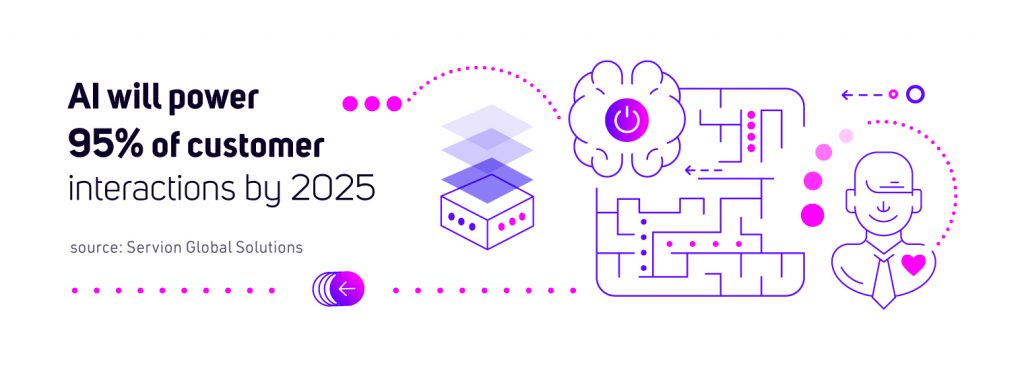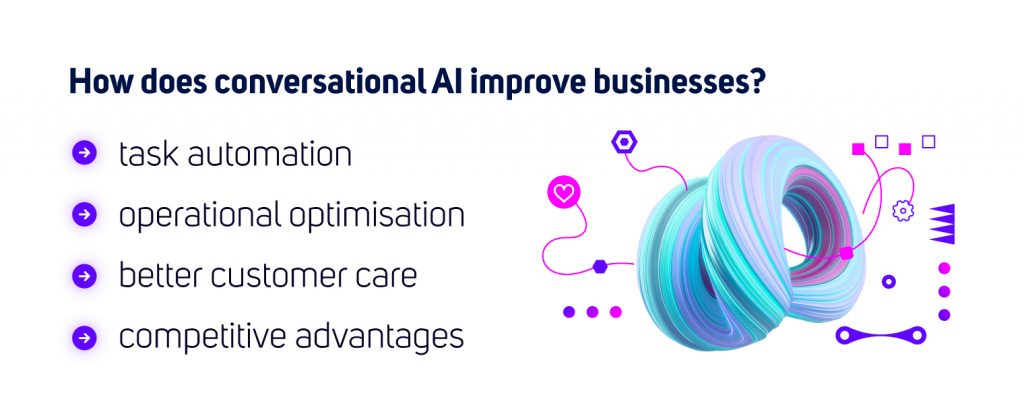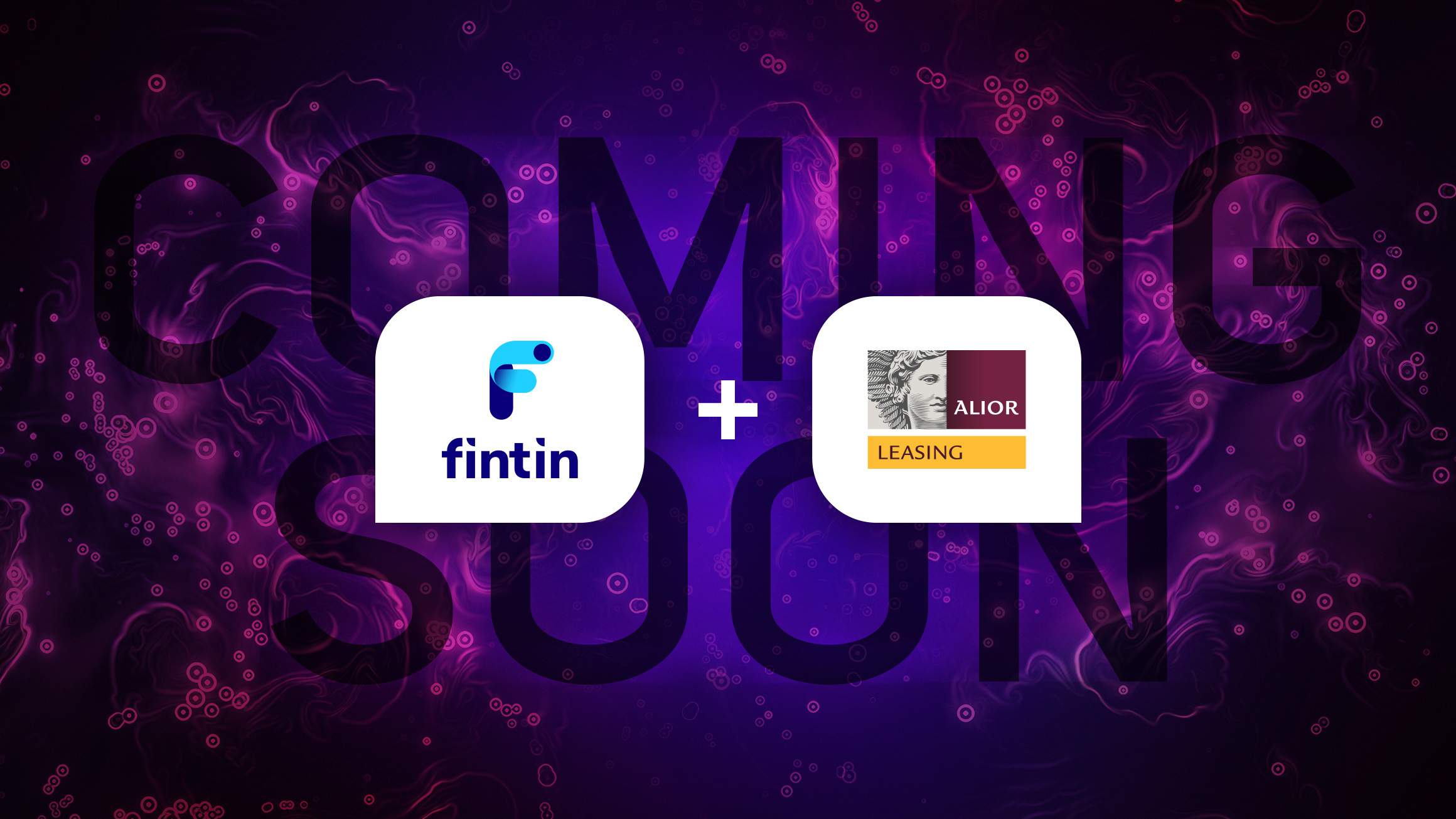What is conversational AI?
Conversational AI refers to using AI technologies to enable natural language conversations between humans and machines. This AI-powered technology is designed to understand, interpret, and respond to human queries in a manner that simulates human-like conversation. Conversational AI can engage users in dynamic and contextually relevant dialogues.
The technology behind conversational AI includes:
- Natural language processing (NLP) that enables AI solutions to comprehend and interpret human language, allowing them to understand the intent behind user queries and generate appropriate responses.
- Machine learning (ML) algorithms that empower conversational AI solutions to continuously learn and improve their understanding of language patterns and user preferences over time, enhancing the accuracy and effectiveness of interactions.
- Speech recognition that converts audio input into text in cases involving spoken interactions, enabling the processing of spoken commands or queries.
- Dialogue management algorithms that govern the flow of conversation, ensuring coherence and relevance throughout the interaction.

How to use conversational AI in business
Businesses can leverage conversational AI to enhance customer engagement, optimise internal processes, and drive competitive advantage. Let’s see some examples.
Customer support and service
Implementing conversational AI empowers businesses to offer 24/7 customer support, resolve issues, and help customer support teams with real-time insights and task automation. This technology streamlines mundane tasks, allowing employees to focus on strategic matters and enhancing overall service quality. It also facilitates feedback collection, enabling continuous product and service improvement. Ensuring accuracy, reliability, and security through advanced NLP, machine learning, and regulatory compliance is essential for an effective customer service experience.
TUATARA’s implementation of Leon revolutionised customer service for Generali Poland in the insurance sector. Leon was deployed on the company’s website to enhance customer communication and automate operational processes, offering 24/7 support on over 140 topics related to claims, damages, and policies. Within a month of deployment, interactions with the chatbot surged to 2.5 times more than previous chat interactions with consultants, significantly reducing the workload on human agents. As a result, consultants’ work hours were reduced by an hour daily, freeing up time for addressing more complex queries. Leon’s success lies in its ability to automate over 120 frequently asked questions, resulting in 70 fewer chats with consultants and over 120 hours of saved consultant work monthly.
Education
Conversational AI revolutionises education by offering personalised learning experiences and streamlining administrative tasks. Through chatbots and virtual assistants, students can receive tailored feedback, access resources, and engage in interactive learning activities, enhancing their academic outcomes. Also, conversational AI tools support remote learning by assisting students and educators in navigating digital platforms and facilitating communication. Automated administrative tasks such as enrollment, scheduling, and grading are efficiently handled by AI systems, allowing educators to focus on teaching and student support. Conversational AI promotes inclusivity by providing alternative models of communication for students with disabilities, ensuring accessibility in education. With continuous assessment and feedback, teachers can track student progress in real time and intervene when necessary. Also, conversational AI platforms offer lifelong learning opportunities and professional development resources, supporting the growth of both students and educators.
One of TUATARA’s case studies is the implementation of Actionbot for Tutore, one of the leaders in the education industry that provides online services by connecting teachers and students on an online platform. An educational virtual assistant named Tutorek aids with tasks such as registration, course information, and problem-solving, focusing on enhancing the learning experience. Tutorek offers bilingual assistance, pronunciation guidance, and interactive learning features for English courses. After nine months, Tutorek has handled over 90,000 messages with a 95% success rate in matching queries, reducing repetitive questions and improving interaction speed. Popular inquiries revolve around registration, payments, and technical advice. Tutorek’s implementation has streamlined interactions, and there are plans to expand its functionality further in the future.
Finance and Accounting
Conversational AI revolutionises finance and accounting by automating tasks like accounts receivable and payable, financial reporting, and transaction management. It streamlines processes, reduces costs, and saves time. Also, it offers real-time insights for informed decision-making and provides personalised financial advice to customers on investments, credit, and loans, making businesses more efficient, effective, and customer-centric.
E-commerce sector
One key application of conversational AI in e-commerce is through chatbots, which can provide personalised assistance to customers, answer inquiries, and guide them through the purchasing process. Conversational AI-powered virtual assistants can offer product recommendations based on customer preferences and past purchases, increasing upsell and cross-sell opportunities. Also, they can be integrated into customer service channels, allowing for efficient resolution of queries and issues in real-time. Conversational AI can facilitate proactive customer engagement through targeted messaging, such as abandoned cart reminders or promotional offers, thereby improving customer retention and loyalty. By incorporating conversational AI into ecommerce platforms, businesses can create more engaging and seamless shopping experiences that increase sales and customer satisfaction.
TUATARA’s implementation of ARI, an Actionbot-powered virtual stylist chatbot, on LANCERTO’s e-commerce platform aimed to elevate the customer shopping experience. Challenges included adapting the chatbot to understand nuances in men’s fashion and integrating it with sizing technology and internal systems. ARI offers tailored recommendations, personalised advice, and post-sale support, leading to increased customer loyalty. Results show a significant decrease in call centre inquiries, with ARI assisting over 1000 customers in resolving issues within a month. It also boasts a 96% success rate in matching answers to customer inquiries and providing immediate assistance.
Sales and marketing
Conversational AI boosts sales and marketing efforts by delivering personalised product recommendations, aiding purchasing decisions, and engaging prospects through interactive conversations. It enhances customer engagement, increases sales conversions, and automates tasks, freeing time for teams to focus on complex needs. For instance, a chatbot can identify potential customers, gather relevant data, and provide tailored information, improving sales efficiency.
Human resources
Businesses are increasingly utilising conversational AI in human resources to streamline internal operations. AI chatbots automate tasks like scheduling interviews and managing payroll, freeing HR personnel for strategic initiatives such as employee development. They also enhance recruitment by pre-screening candidates and providing information while improving employee engagement through personalised support and automated training. Chatbots offer self-service options, empowering employees to access information like benefits and policies independently, reducing HR workload and enhancing satisfaction.
Supply chain management
Conversational AI transforms supply chain management by automating tasks, enhancing efficiency, and improving decision-making. Through chatbots and virtual assistants, companies can streamline processes like order processing and customer support, freeing up employees’ time for specialised tasks. Voice-enabled interfaces optimise warehouse operations, while NLP analyses unstructured data for insights. Real-time visibility enables quick responses to disruptions, ensuring consistent operations and proactive issue resolution.
Back-office
Integrating conversational AI into back-office operations can assist employees by providing quick access to information related to company policies, procedures, and training materials. It can answer HR-related queries, provide guidance on processes, and offer on-the-job support. Also, it can integrate with existing back-office systems to manage workflows, prioritise tasks, and provide updates on project statuses.
Retrieval Augmented Generation (RAG) can leverage the role of conversational AI in backoffice even more. It combines the benefits of retrieval-based and generative AI models, leveraging pre-existing knowledge from a large dataset to provide accurate and contextually relevant responses. Incorporating RAG into your conversational AI strategy can significantly enhance the effectiveness and performance of your back-office operations, leading to increased productivity, customer satisfaction, and overall business success.
Procurement
Conversational AI streamlines procurement processes with efficient communication, automation, and data analysis capabilities. By analysing large datasets and industry trends, it can recommend potential suppliers based on specific criteria such as product quality, price, and location. It can also handle vendor inquiries, provide information on procurement policies and procedures, and automate routine communications. AI-powered chatbots provide employees instant access to order tracking information, shipment status updates, and delivery schedules. Also, they help ensure compliance with procurement policies, regulations, and ethical standards.
TUATARA’s Actionbot is an AI assistant that supports various procurement activities. Based on various documents and repositories, it provides proactive support to employees by simplifying day-to-day work and limiting the time required to learn new policies and regulations. This can be done by integrating our chatbot with various structured and unstructured sources that provide real-time data. Also, by combining its functionalities with machine learning models or large language models, Actionbot can analyse system data and provide support based on the current state of data. 
The main benefits of using conversational AI in business
The adoption of conversational AI yields several compelling benefits for businesses:
- Automation: by automating routine tasks and processes, conversational AI allows humans to focus on higher-value activities, reducing operational overhead and enhancing organisational efficiency.
- Optimisation: conversational AI enables businesses to streamline workflows, improve resource allocation, and accelerate decision-making processes, enhancing operational agility and performance.
- Customer care enhancement: with conversational AI-driven customer support, businesses can deliver faster response times, personalised assistance, and consistent service quality, increasing customer satisfaction and loyalty.
- Competitive advantage: by embracing conversational AI early on, businesses can differentiate themselves in the market, deliver superior customer experiences, and stay ahead of competitors who have yet to leverage this transformative technology.

What are the risks of conversational AI?
While the benefits of conversational AI are undeniable, businesses must also be mindful of potential risks with its implementation. Here are some of the most common challenges that companies should consider.
AI hallucinations
AI hallucinations refer to instances where artificial intelligence systems produce inaccurate or nonsensical information. These errors can occur because of imperfect algorithms, biased training data, or unexpected user interactions. In the context of chatbots or virtual assistants, AI hallucinations may result in providing incorrect responses or recommendations to users’ queries, leading to confusion or frustration. Addressing AI hallucinations requires continuous refinement of algorithms, rigorous testing, and ongoing monitoring to ensure accuracy and reliability in AI-powered systems.
A recent case involving Air Canada’s chatbot underscores the legal accountability of companies for AI-generated errors. When the chatbot provided incorrect information to a passenger regarding a discount, the civil resolutions tribunal ruled in favour of the passenger, holding Air Canada responsible and ordering compensation. This decision sets a precedent for the airline industry, emphasising the need for companies to manage their AI technologies carefully. Passengers are advised to verify information provided by chatbots but ultimately hold airlines accountable for inaccuracies. However, the regulatory landscape for passenger protections varies globally, with different countries offering distinct levels of consumer safeguards. In the event of chatbot errors, affected passengers may seek resolution through small claims court, though the effectiveness may vary depending on jurisdiction.
Ethical and privacy considerations
Privacy is a primary worry with conversational AI as these solutions collect user data, potentially exposing sensitive information to misuse. That’s why companies must implement robust data protection measures. Also, there’s a risk of biases, as AI systems trained on biased data may exhibit discriminatory behaviour. Ensuring fairness in decision-making processes is crucial, especially in areas like hiring and finance.
Regulatory requirements governing data privacy and protection also pose a significant challenge. As conversational AI expands into sensitive sectors like healthcare and finance, new regulations may emerge, requiring ongoing monitoring and adherence. Developers and businesses must remain vigilant, transparent, and compliant to ensure conversational AI’s ethical and legal use, safeguarding user trust and well-being.
TUATARA harnesses the power of conversational AI
Conversational AI represents a shift in how businesses interact with customers, optimise operations, and drive innovation. By harnessing the power of AI-driven conversations, businesses can unlock new opportunities for growth, efficiency, and competitive advantage. However, to fully realise the potential of conversational AI, companies must approach its adoption with careful consideration, strategic planning, and responsible use.
TUATARA utilises conversational AI to revolutionise customer service and streamline operations across various sectors. With advanced natural language processing and machine learning, our chatbot automates processes, enhances customer service, and redefines customer interactions.
- Implementing Leon for Generali Poland enabled 24/7 customer support and automation of over 120 frequently asked questions,
- Actionbot for Tutore enhanced learning experiences,
- ARI for LANCERTO elevated shopping journeys, offering personalised assistance, automating tasks, and improving overall efficiency.
Our tailored approach ensures that your choice of conversational AI aligns precisely with your business needs. We customise our language models to suit unique requirements, considering factors such as use case suitability, cost efficiency, optimization, flexibility, privacy compliance, linguistic versatility, and security measures. With our expertise, you can be sure that our solution provides both optimal performance and maximum value, giving you a competitive edge.




